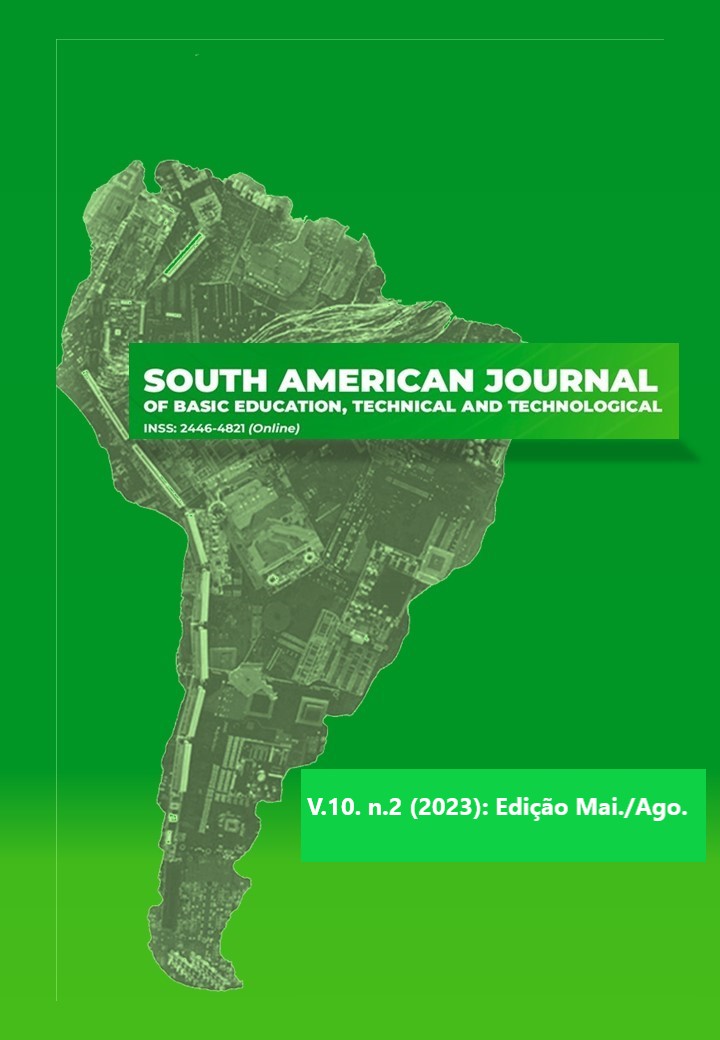PERSPECTIVA EPISTEMOLÓGICA DO ENSINO DE CIÊNCIAS, TECNOLOGIA E MATEMÁTICA NO BRASIL
Keywords:
Education, Mathematics Education, Sciences, Technology.Abstract
The theme of this article is: Epistemological perspective of the teaching of science, technology and mathematics in Brazil produced in the field of Research Foundations and Methodologies for the teaching of Natural Sciences and Mathematics of the Graduate Program in Science and Humanities Teaching (PPGECH) from the Federal University of Amazonas (UFAM) which aimed to demonstrate a brief history of teaching science, technology and mathematics in Brazil. This is an excerpt that seeks to demonstrate the epistemological construction of these disciplines: science, mathematics and technology that are important in the construction of scientific knowledge. Being science and technology within a critical sociocultural analysis of the reality experienced from the 1950s to the present day, where we seek to create a chronological analogy of the epistemological development relating to the reality of each era. It also demonstrates the trends in the teaching of mathematics education, trends that have undergone an evolution in education, but specifically in teaching, having been registered since the 1950s to the present day, seeing the importance of the development of mathematics when the student-teacher relationship is involved. In the composition of the epistemological foundations, the theoretical-methodological approaches pointed out here are based on the reflections produced in the scope of the Epistemology of Natural Sciences, Mathematics and Sciences discipline of the Master's Course in Science and Humanities Teaching in the teaching and learning area of the Postgraduate Program -graduation – PPGECH/UFAM. Methodological strategies are linked to post-critical modes of research in education.
Downloads
References
DUSSEL, E. 1492: O encobrimento do outro: A origem do mito da modernidade: Conferências de Frankfurt. Petrópolis, RJ: Vozes, 1993.
KRASILCHIK, M. Formação de professores e ensino de ciências: tendências nos anos 90. In: MENEZES, L. C. (Org.). Formação continuada de professores no contexto iberoamericano. São Paulo: NUPES, 1996, p.135-140.
OSÓRIO, R. Educação permanente e educação de adultos. Lisboa: Instituto Piaget. 2003.
KRASILCHIK, M. Prática de ensino de biologia. São Paulo: Harbra, 1998.
VACCAREZZA, L. S. Ciência, tecnología y sociedade: el estado de la cuestión em América Latina. Revista Iberoamericana de Educación, v.18, p.21-33, 1999.
VARSAVSKY, O. Ciencia, política y cientificismo. Buenos Aires: CEAL, 1979.
OLIVEIRA, M.B. Neutralidade da Ciência, desencantamento do mundo e controle da natureza. Scientiae Studia, v.6, n.1, p.97-116, 2008.
MEDINA, M.; SANMARTÍN, J. Ciencia, tecnología y sociedad: estudios interdisciplinares en la universidad, en la educación y en la gestión pública. Barcelona: Anthropos, 1992.
MACEDO, E. Ciência, tecnologia e desenvolvimento: uma visão cultural do currículo de ciências. In: LOPES, A. C.; MACEDO, E. (orgs.). Currículo de ciências em debate. Campinas: Papirus, 2004.
FROTA PESSOA, O. et al. Como ensinar ciências. São Paulo: Nacional, 1987.
PIAGET, J. A Epistemologia Genética. Trad. Nathanael C. Caixeira. Petrópolis: Vozes, 1971. 110p.
MOREIRA, M. A. Teorias de Aprendizagem. São Paulo: Editora Pedagógica e Universitária, 1999.
KRASILCHIK. Prática de ensino de biologia. São Paulo: Harbra, 1998.
FOUREZ, G. Alfabetización científica y tecnológica. Acerca de las finalidades de la enseñanza de las ciencias. Buenos Aires, Colihue, 1997.
MARCO, B. La alfabetización científica en la frontera del 2000. Kikirikí, 44-45, 35-42, 1997.
LÓPEZ CEREZO, J. A. Ciencia, tecnología y sociedad. Una introducción al estudio social de la ciencia y la tecnología. Madrid: Tecnos, 1999.
NASCIMENTO, F. Pressupostos para a formação crítico-reflexiva de professores de ciências na sociedade do conhecimento. In: MIZUKAMI, M. G. N.; REALI, A. M. M. R. (orgs.). Teorização de práticas pedagógicas: escola, universidade, pesquisa. São Carlos: UdUFSCar, 2009, p. 35-72.
DYSON, F. Can science be ethical? The New York Review of Books, XLIV/6, 46-49, 1997.
LEITE, S. Suma histórica da Companhia de Jesus no Brasil (Assistência de Portugal). Lisboa, Junta de Investigações de Ultramar, 1965.
FIORENTINI, D.; LORENZATO, S. Investigação matemática. Campinas, SP: Autores Associados, 2006.
BRASIL. LDB – Lei de Diretrizes e Bases da Educacional. Lei 9.394/96
BRASIL. Secretaria de Educação Fundamental. Parâmetros curriculares nacionais: introdução aos parâmetros curriculares nacionais / Secretaria de Educação Fundamental. – Brasília: MEC/SEF, 1997.
SOARES, K.M. História da Matemática na Formação de Professores no Ensino Fundamental – (1ª a 4ª série). Disponível em: http://www.tede.udesc.br/tde_arquivos/10/TDE-2006-02-09T13:38:05Z55/Publico/Kasselandra%20Mattos%20Soares.pdf. Acesso em 20 nov 2020.
LESSA, J.R. Euclides - O Pai da Geometria - InfoEscola. Disponível em: http://infoescola.com/biografias/euclides. Acesso em 05 de nov. 2020.
PIAGET, J. Aprendizagem e conhecimento. Rio de Janeiro: Freitas Bastos, 1975.










